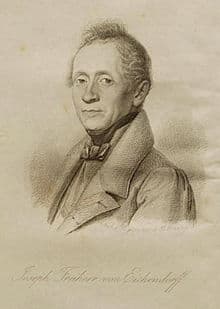
Joseph von Eichendorff, 1841
Joseph von Eichendorff’s poetry addresses a number of basic concepts, including the passing of time and nostalgia. Time for Eichendorff “is not just a natural phenomenon but each day and each of our nights have a metaphysical dimension.” The morning, on the other hand evokes the impression that “all nature had been created just in this very moment, while the evening often acts as a metaphor for the pondering of transience and death.”
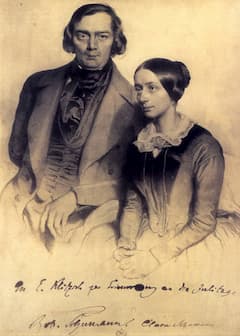
Robert and Clara Schumann
Nostalgia, in turn, has been identified with the phenomenon of infinity. Comprised of longing and melancholy, “the inner emotion for longing is to long for, the inner emotion of melancholy is to mourn.” Theodor Adorno identified Eichendorff as “a poet of homesickness,” and in a long line of poems titled “In a foreign Land” Eichendorff combines homesickness, nostalgia, and the passing of time with the concept of transience and death.
Aus der Heimat hinter den Blitzen rot | From my homeland, beyond the red lightning, |
Da kommen die Wolken her, | The clouds come drifting in, |
Aber Vater und Mutter sind lange tot, | But father and mother have long been dead, |
Es kennt mich dort keiner mehr. | Now no one knows me there. |
|
|
Wie bald, ach wie bald kommt die stille Zeit, | How soon, ah! how soon till that quiet time |
Da ruhe ich auch, und über mir | When I too shall rest |
Rauscht die schöne Waldeinsamkeit, | Beneath the sweet murmur of lonely woods, |
Und keiner kennt mich mehr hier. | Forgotten here as well. |
Robert Schumann: Liederkreis, Op. 39 – No. 1 In der Fremde (Sebastian Bluth, baritone; Anita Keller, piano)
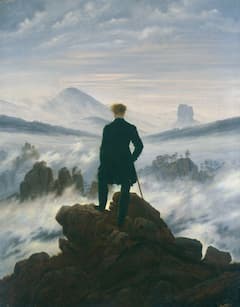
Wanderer above the Sea of Fog by Caspar David Friedrich
Robert Schumann wrote to Clara in 1840, “This ceaseless inner music is almost killing me, I am almost obsessed by it. Oh Clara, what bliss it is to compose for the voice! I have done without it for a long time.” The Liederkreis based on poems written by Joseph von Eichendorff was completed before his marriage to Clara. The entire collection of poems is not based on the usual topic of love, but on solitude. There is no overarching narrative to hold the cycle together as it is more loosely based on themes and connections within the twelve poems.
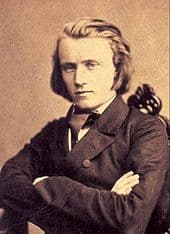
Johannes Brahms, 1853
With the Eichendorff Liederkreis Schumann virtually invented a new type of song, the romantic night piece, serene, ecstatic, or ominous. “In der Fremde” opens the cycle and it is typical in its expression of estrangement and nostalgia amid a dark, woodland landscape. Schumann’s tune has a haunting pathos, discreetly heightened by its gently rippling arpeggio accompaniment. Johannes Brahms took on the same poem more than a decade later, and discloses great proficiency in subtly altering musical details between mostly similar strophic stanzas. He probably showed his setting to Schumann on the occasion of his first visit, and the elder composer must have been overjoyed at receiving such unbridled musical homage.
Johannes Brahms: 6 Gesänge, Op. 3 – No. 5 In der Fremde (Doris Soffel, mezzo-soprano; Charles Spencer, piano)
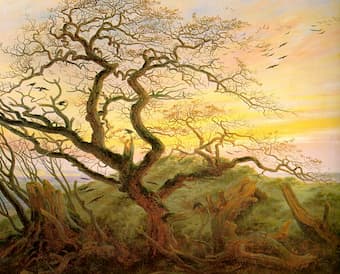
The Tree of Crows by Caspar David Friedrich
The Schumann Liederkreis based on poems by Eichendorff contains an additional poem entitled “In foreign Lands.” While the opening song had started with a brooding and profound utterance of loneliness and separateness, now the wind cannot be trusted. It speaks of other times and places, joyous unions and beloved people who are out of reach. Nature is not there to comfort or help the lonely soul, but becomes a disorienting and disturbing force.
Ich hör’ die Bächlein rauschen | I hear the brooklets murmuring |
Im Walde her und hin, | Through the forest, here and there, |
Im Walde, in dem Rauschen | In the forest, in the murmuring |
Ich weiß nicht, wo ich bin. | I do not know where I am. |
|
|
Die Nachtigallen schlagen | Nightingales are singing |
Hier in der Einsamkeit, | here in the solitude, |
Als wollten sie was sagen | As though they wished to tell |
Von der alten, schönen Zeit. | Of lovely days now past. |
|
|
Die Mondesschimmer fliegen, | The moonlight flickers, |
Als säh’ ich unter mir | As though I saw below me |
Das Schloß im Tale liegen, | The castle in the valley, |
Und ist doch so weit von hier! | Yet it lies so far from here! |
|
|
Als müßte in dem Garten | As though in the garden, |
Voll Rosen weiß und rot, | Full of roses, white and red, |
Meine Liebste auf mich warten, | My love were waiting for me, |
Und ist doch so lange tot. | Yet she died so long ago. |
Robert Schumann: Liederkreis, Op. 39 – No. 8 In der Fremde (Matthias Goerne, baritone; Eric Schneider, piano)
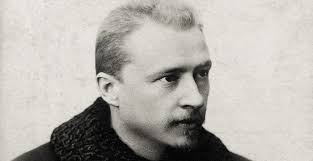
Hugo Wolf
Joseph Eichendorff was one of Hugo Wolf’s (1860-1903) favorite writers, and the composer fashioned a total of 26 songs. And that includes three settings of poems titled “In der Fremde.” Composed early in his career, Wolf was already attracted to the images of the archetypal lone traveller, and the outsider in physical and spiritual exile. With Wolf the singer continuously slips into a new persona, each conceived scenically as the medium for a first-person monologue. Yet for all the thematic contrast there is a formal element, which unifies all of these songs: two-or four-bar phrases in Wolf’s music correspond to the conceptual context the poet chiefly expresses in a single line. No
group of bars is set down at random next to another. Instead he draws musical unity from the text itself, which is expressed in the piano part.
Da fahr’ ich still im Wagen, | Silent I ride in the coach, |
Du bist so weit von mir, | You are so far from me, |
Wohin er mich mag tragen, | Wherever it may bear me, |
Ich bleibe doch bei dir. | I shall remain with you. |
|
|
Da fliegen Wälder, Klüfte | Woods, gorges fly by, |
Und schöne Täler tief | And valleys lovely and deep, |
Und Lerchen hoch in Lüften, | And larks high in the air, |
Als ob dein’ Stimme rief. | As if your voice were calling. |
|
|
Die Sonne lustig scheinet | The sun shines brightly |
Weit über das Revier, | Across the countryside, |
Ich bin so froh verweinet, | I weep such tears of joy, |
Und singe still in mir. | And my heart sings within me. |
|
|
Vom Berge geht’s hinunter, | Down from the mountain I go, |
Das Posthorn schallt im Grund, | The posthorn rings out below, |
Mein’ Seel’ wird mir so munter, | My soul becomes so joyful, |
Grüss’ dich aus Herzensgrund. | I greet you from my heart. |
Hugo Wolf: In der Fremde I (Christoph Prégardien, tenor, Michael Gees, piano)
